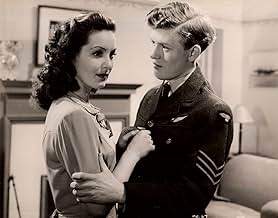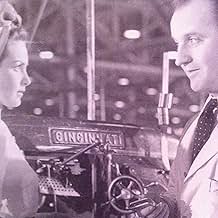Aggiungi una trama nella tua linguaA young woman called into service at a factory during World War II falls in love with a member of the RAF.A young woman called into service at a factory during World War II falls in love with a member of the RAF.A young woman called into service at a factory during World War II falls in love with a member of the RAF.
- Regia
- Sceneggiatura
- Star
- Mrs. Blythe
- (as Amy Vaness)
- Mrs. Hammond
- (non citato nei titoli originali)
- Brenda - Worker at the Factory
- (non citato nei titoli originali)
Recensioni in evidenza
This movie is part love story and part propaganda-flic. The propaganda elements are more subtle than in many 40s films eg 'The Next of Kin'. However the life of the factory girl is glamourized. This is Celia's escape from the domestic drudgery of caring for her elderly father and allows her to find true love. Also the togetherness of the factory girls is emphasised throughout the film. The contrast between shots of Celia demure and alone that we see at the start of the film and the final scene of her as an integral part of the group is marked. Not only is munitions work vital to the war effort, we are being told, but it also provides companionship, an outlet and fulfillment for women.
A film about and for women in the workplace may sound like a step forward from the usual patriarchal portrayal of the female sex. Yet, at its heart this is a deeply conservative film. Ultimately Celia finds fulfillment with and through a man and whilst the companionship of women is important, all the female characters are searching for a husband.
However, the Directors should be applauded for having done a good job in making an enjoyable, informative propaganda film.
By the way, look out for the shots of Patricia Roc's feet when she is talking to her husband. Is this an erotic charge or fear of chilblains? Watch the movie and let us know what you think.
Although it is clearly a propaganda film in essence, this wartime drama is quite interesting for not being as simplistic as some of its peers. In this family drama we don't really have a message pushed that hard but are instead left to draw out own warmth from a narrative that has a surprising amount about class within it. In this regard it does produce some interesting threads although those looking back for sharp comment will not find it because this is still a melodrama with a propaganda edge. As such it is a bit plodding at times but I still quite enjoyed it for what it was although I can understand why some viewers have found it a bit dull and lacking in sharpness.
The cast are pretty good with the material. Roc and Dunn give good if unspectacular turns as the daughters while Marriott provides a working class comic relief to proceedings as the father. Te support cast features good work from Jackson, Crawford and others but the performances are not as good as I would have liked just because the script doesn't cut as deep as it could have although perhaps understandably so.
Overall then a solid wartime melodrama with the heavy propaganda scaled back to allow for a more natural and convincing story delivered with solid turns. Aside from the touch of class politics there isn't that much to set the screen on fire but it should make good as a matinée on a weekend afternoon sort of thing.
It is also unusual for the era in its unabashed portrayal of young women as actively sexual beings with a healthy, even predatory, interest in men. The sole - and glaring - exception to this model is the central heroine, Celia. Patricia Roc's portrayal of her is so overwhelmingly timid, self-effacing and prudish, it comes as little less than miraculous that she manages to bag Fred: a young Airman in the shape of Gordon Jackson. Mind you, he's no firebrand either: together, they make an infuriatingly ineffectual couple.
Far more interesting is the spiky relationship of social opposites Jennifer (Anne Crawford) - privileged/haughty/indolent - and no-nonsense factory foreman Charlie (Eric Portman). In this pair's uneasy mutual attraction and verbal sparring we see echoes of Shakespeare's Beatrice & Benedick.
N.B.: Watch out for a lovely cameo by Irene Handl as the newlyweds' landlady.
My father recruited workers in Missouri and Oklahoma for an ordinance plant during the war. Most of the workers he recruited--whom he personally put on trains headed north--were women who were happy to leave those depressed areas for higher pay, excitement and contribution to the war effort. Women were glad to go to work in factories, and in 1945 they were happy to give it up for marriage and so returning soldiers could have jobs. That's just the way it was then, and one can't put a different spin on how people behaved.
I hope to see this film again.
Lo sapevi?
- QuizGrandpa Jim comments that his daughter Phyllis has progressed from dating "local lads" to "the United Nations." Interestingly, although the international organization with that name did not exist until two years after the film's release, the term "United Nations' was used to describe the allied forces arrayed against the Axis Powers. FDR used the term frequently.
- BlooperAlthough Fred Blake (Gordon Jackson) is flight crew on a Short Stirling (the type of aircraft Celia makes parts for and which is seen being towed out of the factory), there are at least two shots of Fred's aircraft taking off/climbing which are actually an Avro Lancaster.
- Citazioni
Charlie: You can't cook or sew, I doubt if you can even knit. You know nothing about life, not what I call life. You're still only a moderate hand on a milling machine and if you had to fend for yourself in the midst of plenty you'd die of starvation. Those are only your bad points. I'm not saying you haven't got any good ones.
Jennifer: You're mighty generous Mr Forbes. As for you, you've no looks, you're old fashioned, morbidly suspicious, dull, and your pipe makes horrible bubbly noises.
- Curiosità sui creditiOpening credits --- over archive footage: NOTE: The orange is a spherical pulpish fruit of reddish-yellow color.
- ConnessioniFeatured in The Unforgettable Gordon Jackson (2012)
- Colonne sonoreSymphony No. 5 in C minor, Op. 67
(uncredited)
Music by Ludwig van Beethoven
Played over main titles and later in the score
I più visti
- How long is Millions Like Us?Powered by Alexa
Dettagli
- Tempo di esecuzione1 ora 43 minuti
- Colore
- Proporzioni
- 1.37 : 1
Contribuisci a questa pagina



































